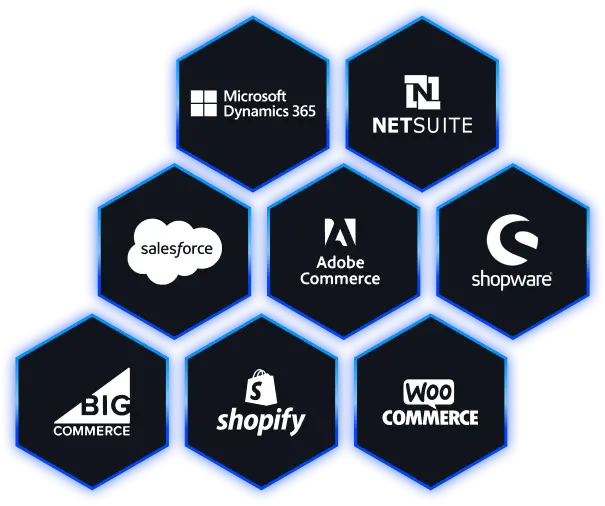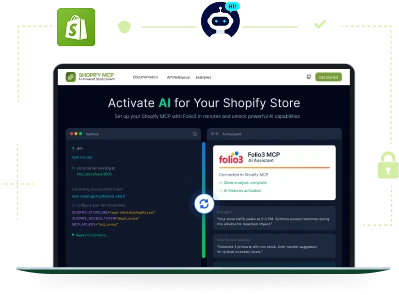We help manufacturers, wholesalers, and distributors launch self-service B2B eCommerce experiences to outpace competition and meet expectations of digitally native buyers.

Our team’s expertise with cutting edge technologies in B2B eCommerce as well as their dedication to innovation and problem-solving make us the ideal partner for anyone looking to deliver Amazon grade experiences for B2B buyers.









We have been working with Folio3 since 2018. We are extremely fortunate to have found such a fantastic team of people. They are professional, organized, time-sensitive, and their work is stellar. Most recently, we needed support with dynamic schema mark-up and GA4 event integrations.
![]()

As you know our project is quite complicated & involves some fairly intricate customizations. Overall we are very happy with the progress so far. We feel that your team understands our requirements very well & also anticipates issues & provides effective solutions.
![]()

The Folio3 team is a pleasure to work with. During the project, they were responsive and their turnaround time was always stellar.
![]()
See how we have helped manufacturers, wholesalers, and distributors deliver seamless user experiences to their buyers.


How Bird B Gone found success on BigCommerce after migrating from Magento with advanced analytics and tracking set up.


See how Eco Products replatformed from their legacy platform to BigCommerce to reduce the Total Cost of Ownership and mitigate frequent downtimes.

How Metro Shoes adopted a headless architecture with BigCommerce as the backend, WordPress as the frontend, and Elasticsearch for advanced search and filtering.
With 12 years of track record in building custom B2B eCommerce solutions for manufacturers and wholesalers, we understand the nuances and complexities of B2B commerce, from bulk ordering processes to account-specific pricing and workflows.
Whether it’s integrating with legacy systems, implementing advanced features, or solving intricate technical challenges, our team thrives on finding innovative solutions that simplify the most demanding requirements.
At Folio3, we believe in combining technical expertise with a deep understanding of business strategy. Our solutions are not just technically sound but are also designed to align with your larger business goals.
Our team comprises some of the most talented and skilled developers in the industry. Don’t take our word for it; talk to us and find out why we confidently call ourselves the top 1%.
Buyers now expect seamless, efficient, and self-service purchasing experiences similar to what they encounter in the B2C world. They want a platform that gives them up-to-date product information, 24/7 order capabilities, personalized experiences that they receive from a salesperson, dynamic buying journeys, and faster fulfillment. B2B buyers that once preferred in-person sales are now replaced by digitally native customers that prefer self service online experiences. If you don’t provide that experience today, you’ll leave a gap to be filled by your competitor.

B2B and B2C eCommerce differ significantly in their processes, audiences, and requirements. While B2C focuses on individual customers with straightforward transactions, B2B caters to businesses with more complex needs such as bulk ordering, customized pricing, and multi-level approvals.

EDI is a traditional system that enables automated communication of data between businesses, typically used for routine orders and invoices. B2B eCommerce, on the other hand, provides a modern, user-friendly interface that allows buyers to browse products, place orders, and interact directly with suppliers online. While EDI is limited to structured data exchange, B2B eCommerce offers a more dynamic, interactive, and flexible approach to managing business relationships.
Deliver tailored shopping experi-ences by leveraging customer data to provide relevant product recommendations, customized pricing, and promotions. This ensures your buyers feel valued & enhances engagement.
Empower your customers to complete purchases effortlessly with intuitive, self-service checkout processes designed for efficiency and convenience, minimizing manual intervention.
Implement flexible pricing engines that serve pricing based on order volume and customer profiles ensuring competitive and fair pricing for your buyers.
Provide feature-rich customer accounts that allow users to manage orders, view transaction histories, track shipments, and access personalized account settings for a seamless experience.
Implement robust user management systems that allow administrators to define roles, permissions, and access levels, ensuring secure and streamlined operations.
Enable businesses to place large volume orders effortlessly with features that simplify the bulk purchase process, reducing time and increasing convenience for buyers.
Allow customers to quickly reorder frequently purchased items with just a few clicks, saving time and improving the user experience.
Provide flexible and customizable shipping solutions, including multiple carrier integrations, real-time tracking, and tailored delivery methods to meet diverse customer needs.
Facilitate easy quotation requests for bulk or customized orders, enabling buyers to engage with your sales team directly and receive tailored pricing.
Combine B2B and Direct-to-Consumer (D2C) capabilities in a single platform to cater to multiple customer segments while maintaining consistent branding and operations.
Offer app-like functionality with Progressive Web Apps (PWAs) that ensure fast, reliable, and engaging user experiences across all devices, without requiring a native app.
Develop dedicated portals tailored to your specific business requirements, featuring advanced functionalities like role-based access, integrations, and customized workflows to meet your unique needs.
Seamlessly integrate with your OMS to ensure efficient order tracking, fulfillment, and management. This integration allows you to synchronize order data and maintain operational transparency.
Connect your eCommerce platform with ERP systems to streamline inventory management, financial processes, and procurement. This ensures data consistency and improves decision-making.
Enhance your B2B eCommerce site with CMS integration, enabling you to manage and update content effortlessly while maintaining a cohesive brand presence across all touchpoints.
Integrate with your CRM to gain actionable insights into customer behavior, improve communication, and foster long-term relationships through personalized interactions and targeted marketing.
Ensure consistent and accurate product data across your eCommerce platform by integrating with a PIM system. This simplifies product updates and enhances the customer experience.
Streamline procurement for your customers by enabling Punchout integration. This allows buyers to access your catalog directly from their procurement systems, simplifying the purchasing process and increasing efficiency.
B2B eCommerce refers to online transactions between businesses, such as wholesalers, manufacturers, and distributors. It involves creating digital platforms where businesses can purchase goods and services from one another efficiently, often involving bulk purchases, negotiated pricing, and customized workflows tailored to the needs of professional buyers.
The best eCommerce platform for B2B depends on your business’s specific requirements. Platforms like Shopify Plus, BigCommerce, and Magento offer excellent features for B2B. Additionally, custom solutions built with frameworks like MERN or Laravel can provide highly tailored functionalities. The ideal choice depends on scalability, integration needs, and budget.
B2B eCommerce works by providing a digital storefront or platform where businesses can browse products, request quotes, negotiate prices, and make purchases. These platforms often include features like bulk ordering, automated workflows, and integrations with ERP and CRM systems to streamline the purchasing and order management process.
Payment processing for B2B eCommerce involves integrating payment gateways that support various methods, such as credit cards, ACH transfers, and invoicing. These platforms must also accommodate payment terms like net-30 or net-60 and ensure secure, PCI-compliant transactions.
To onboard B2B customers, you should add a user-friendly enrollment form on your website. This allows them to fill out their information, set up accounts, and access the platform independently. Personalized support and a clear process for account approvals further enhance the onboarding experience.
Improving B2B eCommerce search involves implementing advanced technologies like ElasticSearch and SearchSpring. These tools enable faster, more relevant results with features such as auto-suggestions, dynamic filtering, and faceted navigation. AI-driven enhancements can analyze user behavior to refine search accuracy, ensuring customers quickly find the products they need.
Building a B2B eCommerce marketplace involves creating a platform that connects multiple vendors with buyers. Key steps include choosing the right technology stack, implementing robust vendor management systems, enabling secure transactions, and offering customizable pricing and shipping options.
A B2B eCommerce solution helps streamline operations, improve customer satisfaction, and drive revenue growth. It provides buyers with a seamless, self-service experience while reducing manual processes and errors. In today’s competitive landscape, a robust eCommerce platform is essential to meeting modern customer expectations and achieving scalability.
Get in touch with our Team!
3080 Yonge Street, Suite 6060, Toronto, Ontario M4N 3N1
Amado Nervo #2200, Edificio Esfera 1 piso 4, Col. Jardines del Sol, CP. 45050, Zapopan, Jalisco, Mexico
C/- Prime Partners Level 4 1 James Place, NORTH SYDNEY New South Wales 2060
160 Bovet Road, Suite # 101, San Mateo,
CA 94402 USA
6701 Koll Center Parkway, #250 Pleasanton, CA 94566
Tel: +1 (408) 412-3813
Export House, Cawsey Way, Woking, Surrey, GU21 6QX
Tel: +44 (0) 14 8339 7625
Folio3 FZ LLC, UAE, Dubai Internet City,
1st Floor, Building Number 14, Premises 105, Dubai, UAE
Tel: +971 04 2505173
49 Bacho Kiro Street, Sofia 1000, Bulgaria
Folio3 Pvt. Ltd, Folio3 Tower, Plot 26, Block B,
SMCH Society, Main Shahrah-e-Faisal, Karachi.
Tel: +92-21-3432 3721-4
First Floor, Blue Mall 8-R, MM Alam Road Gulberg III, Lahore
Corporate 7 by Maaksons, Executive Block, Civic Center 1, Gulberg Green, Islamabad
Tel: 0333 5657425

Set up your Shopify MCP with Folio3.